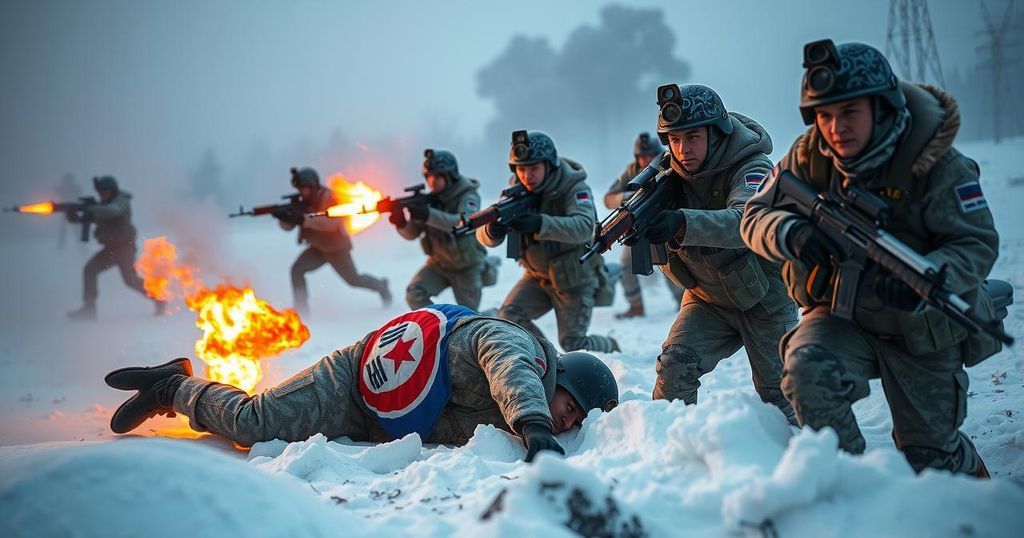Ukrainian military intelligence reports that North Korean troops have mistakenly killed Russian soldiers due to communication issues, resulting in the deaths of eight troops in Kursk, while Ukraine claims over 1,000 Russian soldiers were lost in a single day. Ukraine has also targeted Russian supply lines and voiced its intent to provide humanitarian aid to Syria. Observations from military experts stress the need for preparedness against escalating aggression from Russia.
Reports from Ukrainian military intelligence indicate that North Korean troops have mistakenly killed Russian soldiers due to a language barrier during combat in Kursk, resulting in the deaths of eight members of the Chechen Akhmat unit allied with Russia. The North Korean forces are believed to have been part of a larger group of over 10,000 troops reported to be in the Kursk Oblast to assist Russia’s military efforts. This incident coincides with Ukrainian claims that the Russian military has sustained over 1,000 casualties in just one day as they continue their offensive in eastern Ukraine.
Moreover, Ukraine’s ongoing operations have led to significant damage to Russian military resources, including the destruction of oil tankers in the Black Sea amid adverse weather conditions, which has drawn sharp criticism of Russia’s naval practices. Additionally, Ukraine’s Security Service has reportedly sabotaged a fuel supply train destined for Russian forces in Zaporizhzhia, preventing the delivery of essential resources to the front lines.
In the broader context, President Volodymyr Zelensky has expressed Ukraine’s commitment to providing humanitarian assistance to Syria while emphasizing the ongoing challenges faced by his nation in the conflict. As military engagements intensify, there is growing concern internationally regarding the escalation of hostilities in the region, particularly in light of Ukraine’s recent declarations about the scale of Russian aerial bombardments.
Sir Richard Shirreff, a former senior British Army officer, has cautioned that the UK must begin preparations for potential conflict, noting that the Kremlin has been in a prolonged state of hostility with NATO. His remarks highlight the urgent need for strategic readiness in response to Russia’s aggressive posture over the past decade.
The conflict between Ukraine and Russia has escalated dramatically following Russia’s invasion of Ukraine in 2022, transforming into a multifaceted battleground involving various military alliances and strategic partnerships. North Korea’s involvement on the Russian side, particularly the deployment of forces to support Russia’s military efforts, has been a significant development in this conflict, raising concerns over communication barriers and operational coordination. The Ukrainian military has also been conducting operations aimed at disrupting Russian logistics, leading to various tactical altercations and necessitating the monitoring of both countries’ military strategies. Additionally, the humanitarian dimensions of the conflict, as highlighted by President Zelensky’s pledge to aid Syria, underscore the broader implications of warfare on regional stability and security.
The conflict in Ukraine continues to yield complex dynamics, including friendly fire incidents involving North Korean and Russian troops, a stark reminder of the challenges posed by international military cooperation. With significant Russian casualties reported and effective Ukrainian operations disrupting supply lines, the situation remains volatile. International responses, including humanitarian efforts led by Ukraine, demonstrate a multidimensional approach to addressing the consequences of the ongoing conflict. The need for strategic readiness and a unified response to Russian aggression is increasingly evident as the situation develops.
Original Source: www.independent.co.uk






